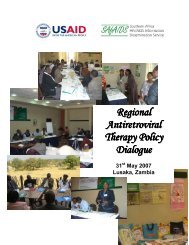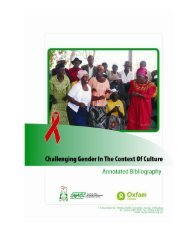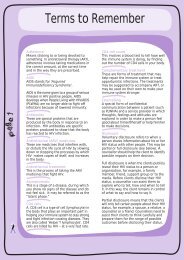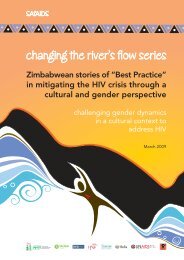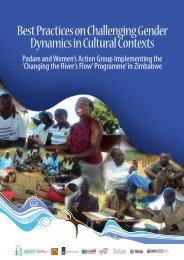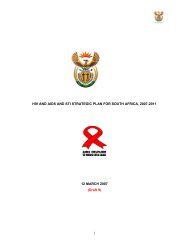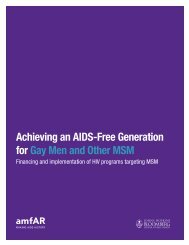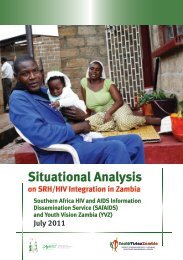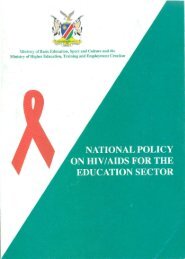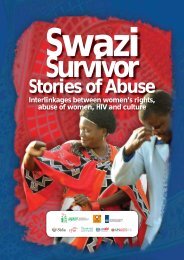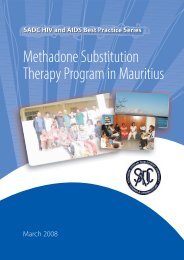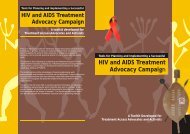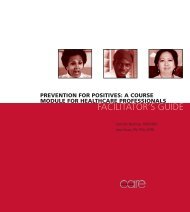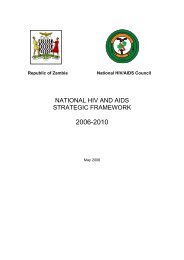Implementation of regional and international HIV prevention - SAfAIDS
Implementation of regional and international HIV prevention - SAfAIDS
Implementation of regional and international HIV prevention - SAfAIDS
- No tags were found...
You also want an ePaper? Increase the reach of your titles
YUMPU automatically turns print PDFs into web optimized ePapers that Google loves.
9.3 Whistle-blower-protectionThe two countries do not have laws to protect whistle-blowers. If one blows the whistle onedoes it at one’s own risk. This has created a situation where people fear to report allegedcorruption cases for fear <strong>of</strong> victimisation. However, in Zambia the ACC has put a provisionin the draft National Corruption Prevention Policy. The idea eventually is to come up with awhistle blowers bill, which can then be enacted into law.9.4 Supreme audit institutionThe Supreme Audit Institution has the onerous responsibility <strong>of</strong> auditing not onlygovernmental but also quasi-governmental institutions <strong>and</strong> reporting on the audit to theSupreme Authority, whatever form it may take, depending on the prevailing political system.However, Krishnamachari (undated) indicated that unless Supreme Audit Initiators are assignedappropriate status <strong>and</strong> given adequate authority, they cannot function effectively.The Auditor’s-General in both countries has the m<strong>and</strong>ate to inspect accounts <strong>of</strong> theMinistries <strong>of</strong> Health, <strong>and</strong> in Swazil<strong>and</strong>, this has been happening annually. The ZambiaConstitution has adequate provisions spelling out the work <strong>of</strong> the Auditors-General.However there is need to ensure independence <strong>of</strong> the functions <strong>of</strong> the Auditors Generalfrom the executive in the two countries.9.5 Oversight from media <strong>and</strong> civil society organisationsThe success <strong>of</strong> the fight against <strong>HIV</strong> <strong>and</strong> AIDS is dependent on the fundamental role <strong>of</strong> themedia. The ability to reach a wider population makes the media a superior weapon to fightthe spread <strong>of</strong> <strong>HIV</strong> <strong>and</strong> AIDS. However in Swazil<strong>and</strong>, there is considerable weakness in mediacoverage <strong>of</strong> gender violence stories. According to responses from FGDs, gender violencestories lack context, are not gender- balanced, ignore gender issues, <strong>and</strong> are normallyreported from a male perspective <strong>and</strong> negatively portray abused women. In 2007 the MediaInstitute <strong>of</strong> Southern Africa (MISA) reported Swazil<strong>and</strong> to have been amongst the four mostoppressive <strong>and</strong> media-unfriendly countries in the region. The other three were Zimbabwe,Lesotho <strong>and</strong> Angola. Government has tight control over the media. According to one localnewsletter, citizens rarely get the opportunity to air their views to a minister, government<strong>of</strong>ficial, community leader or journalist (ASICHUMANE, April-June 2006). In an article by ReutersAlertNet 9 the Alliance <strong>of</strong> Mayors <strong>and</strong> Municipality Leaders on <strong>HIV</strong>/AIDS in Africa (AMICAAL) anNGO co-ordinating the response <strong>of</strong> urban leaders to their towns, felt that the response to <strong>HIV</strong><strong>and</strong> AIDS by the Press was poor. The organisation proposed that reporters become involved,<strong>and</strong> attend conferences held on the epidemic. CANGO <strong>and</strong> MISA regularly try to meet thisneed by calling for workshops for the media <strong>and</strong> NGOs to discuss issues <strong>of</strong> <strong>HIV</strong> <strong>and</strong> AIDS(CANGO, 2007).46In Zambia the media is part <strong>of</strong> the five broad groupings <strong>of</strong> partners <strong>of</strong> the multi-sectoral <strong>HIV</strong><strong>and</strong> AIDS response. In addition, the media is a member <strong>of</strong> the National AIDS Council. Themedia in Zambia is perceived to be relatively robust <strong>and</strong> a true watch-dog <strong>of</strong> society. Criticism<strong>of</strong> Government at times even emanates from State-owned media. The Press is free to publishanything critical <strong>of</strong> the establishment without any fear <strong>of</strong> reprisals.9 http://ourdevelopment.blogspot.com/2008/09/world-corruption-ranking-23-september.html



